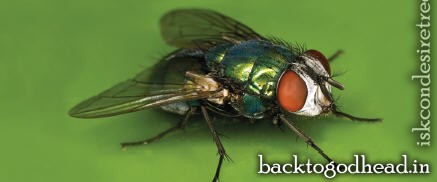I peep at his computer screen. A peculiar-looking little fly rests in the palm of someone’s hand.
“This is a robo-fly,” my friend reveals. “With a wingspan of just three centimeters and weighing but sixty milligrams, it’s the latest offering of nanotechnology. The Harvard researchers who invented it say that such small flying machines could one day be used as spies or to detect harmful chemicals.”
My friend shows me another fantastic construction: nano “Thinking Man,” based on the famous sculpture by Rodin. Just twice the size of a red blood corpuscle, it is 1⁄93,000 the size of the original statue.
Nanotechnology is a branch of engineering that creates machines, motors, and other things at a molecular level at a size of one billionth of a meter. Since the creations are so small, the nanotechnologists involved in this branch are jokingly called “the gods of small things.”
Nature’s Nanotechnology

A buzzing housefly brings me back to reality. As I look at the tiny insect landing on the desk, I compare this housefly with the robo-fly.
Although the robo-fly looks cute compared to the housefly, it scores poorly in functionality. A housefly can fly at 4.5 miles per hour, for hours together. It has a complex system for maneuverability that helps it take off and land in amazing ways, in varied climatic conditions, even upside down on ceilings and laterally on walls. It has four thousand lenses in each eye. In our time of energy crises, the fly has no problem fueling, with nature providing plenty of rotten objects for juice.
The housefly is just one of many types of fly. Zoologists have found no fewer than 120,000 models (species) of flies in nature. One species, the glow-worm, has a built-in lighting system.
Unlike the robo-fly, the ordinary fly, created by God, is not powered by some mechanical arrangement but by the touch of a spiritual spark.
Fly Wars:Might scientists, I ask myself, eventually create something that can rival the housefly?
Srila Prabhupada comments: God is perfect . . . According to the Vedic version, God is the leader of all living entities nityo nityanaμ cetanas cetananam [Katha Upanisad 2.2.13]. We are different from Him because He is all-perfect and we are not . . . We have the qualities of God, but in very small quantity. Therefore we have only a little knowledge. [You can build an] airplane, but you cannot manufacture a mosquito. God has created the mosquto’s body, which is also an airplane. And that is the difference between God and us: we have knowledge, but it is not as perfect as God’s. (Mayapur, March 1976)
Close inspection reveals why the mosquito is so special more special than the Boeing 747. A mosquito has a sensor for human odor, a loud alarm that buzzes before the mosquito bites, a drilling machine, and a suction pump to sip our blood. It has radar that helps avoid collisions; it can land on any surface and then take off without a runway; it never crashes; it operates with an autopilot the spirit soul, who accepts, as vehicles, various bodies from moths to mammoths.
What about a future robomosquito?

Perhaps it is possible. I agree. But would it ever be possible for two robo-mosquitoes or two roboflies to come together and produce a third one? No.
A housefly, however, can lay hundreds of eggs at a time.
We may acknowledge the creativity of the modern scientists. But let’s not forget the original creator, Krishna, who has created nanotechnology in almost everything around us and within us. Each cell that makes up our body is a nano-factory.
A simple example of Krishna’s nanotechnology is that He fits an enormous sequoia tree, which can rise up to 310 feet, into a seed less than half a centimeter wide. And what to speak of the spirit soul within the miniscule seed as well as the colossal tree. The Katha Upanisad tells us that the soul is one ten thousandth the size of the tip of a hair.
A person with an average understanding of spiritual truths will not fail to see that the scientists’ best attempts to prove their competence in nanotechnology are just the newest stunts in the old struggle to supersede God’s creation. Even if scientists were to re-create all the functions of an ordinary fly, without the life force they’ll never make a real fly. Nor will they ever make a selfreproducing robo-fly. Krishna, the original creator, owns the patents. He’s the God of not just small things or big things but of everything. Before Him, we are always nano.
